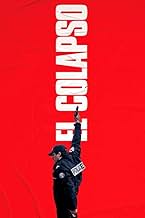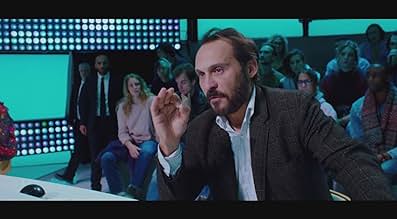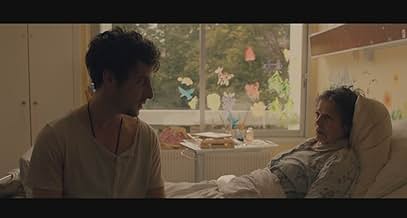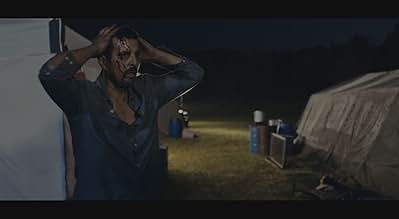What would happen to our society if the system collapsed tomorrow?What would happen to our society if the system collapsed tomorrow?What would happen to our society if the system collapsed tomorrow?
- Awards
- 2 nominations total
Browse episodes
Featured reviews
If you liked those epic long one shot's scenes brought to you by the combo Alfonso Cuarón + Emmanuel Lubezky, you will love this series. You also can notice their influence on the authors of L'Effondrement, because the plot of the movie also brings a postapocalyptical theme.
Don´t look up is another recent comparison regarding the topics covered in one of the chapters of this series. Bringing some uncomfortable truth to the table and having to deal with people's indifference.
Technically astounding, i dont know yet how they filmed some parts of the scenes, but I understand that they put a lot of work into preparing them.
The acting is amazing. Every character is depicted in great detail, and you connect and empathize with each of them.
One of the best series of recent times, and they didn´t need eight seasons for achieving that. Just eight 20min chapters.
Don´t look up is another recent comparison regarding the topics covered in one of the chapters of this series. Bringing some uncomfortable truth to the table and having to deal with people's indifference.
Technically astounding, i dont know yet how they filmed some parts of the scenes, but I understand that they put a lot of work into preparing them.
The acting is amazing. Every character is depicted in great detail, and you connect and empathize with each of them.
One of the best series of recent times, and they didn´t need eight seasons for achieving that. Just eight 20min chapters.
Five episodes, all shot in one take, five different situations in an escalation.
This was so tense it actually gave Chernobyl a match, with much much lesser means. Episode 1 is the weakest, because of the acting, but it already sets the mood : extreme paranoïa, and survival of the fittest!
That was quite an achivement in horror in its purest sense. Highly recomended!
Edit : Episodes 6-8 are on the same model, but add some interconnectivity between some storylines, to great effect.
This excellently made short series is atmospherically dense like Black Mirror.
But it's not about the consequences of technological development.
At least not directly. But about the collapse of the social order, the survival of people while everything around them no longer exists.
Each individual episode represents a certain period of time, e.g. episode 7, which shows a woman surviving 50 days after the collapse of society (one of the best episodes, by the way). The exception is the last episode 8, which shows the events 5 days before the collapse.
A much too unknown series that left a deep impression on me. Unfortunately the series only consists of 8 episodes, each about 15-25 minutes short. The short duration of the episodes is an advantage when designing a captivating episode. I hope there will be a new season with more episodes at some point. With episodes this short, there should be at least 15 episodes.
In terms of production (camera, editing, lighting, sound / music), the consequences are all equal and well done. This is an example of what the European film industry can offer.
Presumably some self-proclaimed ''patriots'' (Neoliberals with great love for the rich) who are delusional will see this series as socialist propaganda.
Each individual episode represents a certain period of time, e.g. episode 7, which shows a woman surviving 50 days after the collapse of society (one of the best episodes, by the way). The exception is the last episode 8, which shows the events 5 days before the collapse.
A much too unknown series that left a deep impression on me. Unfortunately the series only consists of 8 episodes, each about 15-25 minutes short. The short duration of the episodes is an advantage when designing a captivating episode. I hope there will be a new season with more episodes at some point. With episodes this short, there should be at least 15 episodes.
In terms of production (camera, editing, lighting, sound / music), the consequences are all equal and well done. This is an example of what the European film industry can offer.
Presumably some self-proclaimed ''patriots'' (Neoliberals with great love for the rich) who are delusional will see this series as socialist propaganda.
Abstract
Eight exciting chapters, eight moments and extreme situations derived from a sudden? crisis that leaves the planet without supplies.
Review
Starting on J-Day, there is a sudden global collapse whereby the supply of food, energy and other inputs is cut off.
This French miniseries addresses in each chapter distressing situations that arise from that event whose nature we ignore.
But it does not do it in any way: each one of its nervous chapters lasts only around 20 minutes and is filmed in real time with a handheld camera and in a single sequence shot. And it is not a quirk of style: the dramatic effect is prodigious and the technical expertise in the realization in some is astonishing.
The series does not fall into the usual Manichean nihilism of apocalyptic dystopias because, although human miseries appear in each chapter, the result of desperation for survival, gestures of solidarity and collaboration are not absent either.
The situations dealt with are individual or collective, often dilemmatic, with very different locations, different characters (with very few exceptions and few links between them) and with strong social and class notes, but without falling into the cliché. Overall the pacing is distressing but never hysterical, and the filmmakers have a knack for making chapters quite different and with room for surprise.
Filmed in 2019, this dystopia directed by Jérémy Bernard, Guillaume Desjardins and Bastien Ughetto (who stars in one of the most terrifying episodes) is prescient in some aspects of the global coronavirus crisis and undoubtedly related to the prevailing capitalist modes of production.
Pay attention to the final titles of each chapter. If you pay attention, you will see that they are revealing.
Eight exciting chapters, eight moments and extreme situations derived from a sudden? crisis that leaves the planet without supplies.
Review
Starting on J-Day, there is a sudden global collapse whereby the supply of food, energy and other inputs is cut off.
This French miniseries addresses in each chapter distressing situations that arise from that event whose nature we ignore.
But it does not do it in any way: each one of its nervous chapters lasts only around 20 minutes and is filmed in real time with a handheld camera and in a single sequence shot. And it is not a quirk of style: the dramatic effect is prodigious and the technical expertise in the realization in some is astonishing.
The series does not fall into the usual Manichean nihilism of apocalyptic dystopias because, although human miseries appear in each chapter, the result of desperation for survival, gestures of solidarity and collaboration are not absent either.
The situations dealt with are individual or collective, often dilemmatic, with very different locations, different characters (with very few exceptions and few links between them) and with strong social and class notes, but without falling into the cliché. Overall the pacing is distressing but never hysterical, and the filmmakers have a knack for making chapters quite different and with room for surprise.
Filmed in 2019, this dystopia directed by Jérémy Bernard, Guillaume Desjardins and Bastien Ughetto (who stars in one of the most terrifying episodes) is prescient in some aspects of the global coronavirus crisis and undoubtedly related to the prevailing capitalist modes of production.
Pay attention to the final titles of each chapter. If you pay attention, you will see that they are revealing.
L'Effondrement is about collapse of the civilization. It isn't crystal clear what caused the collapse. There might be a few hints, but basically all supply chains fall apart and with them, everything.
What I love about this mini-series is that we might experience something exactly like this*. The show catches panic, desperation and denial very well.
Each episode is dedicated to a different person or a group that experiences collapse in a different way. Some of them end relatively well. Some are a tragedy. A few go sideways...
*except Ep. 05, there are safety systems designed for situations.
What I love about this mini-series is that we might experience something exactly like this*. The show catches panic, desperation and denial very well.
Each episode is dedicated to a different person or a group that experiences collapse in a different way. Some of them end relatively well. Some are a tragedy. A few go sideways...
*except Ep. 05, there are safety systems designed for situations.
- How many seasons does The Collapse have?Powered by Alexa
Details
- Release date
- Country of origin
- Official site
- Language
- Also known as
- The Collapse
- See more company credits at IMDbPro
Contribute to this page
Suggest an edit or add missing content

![Watch Bande-annonce [OV]](https://m.media-amazon.com/images/M/MV5BNWY2M2EzYTYtYWVlZS00OTc0LTg4MTQtMGJjZmQzMzA1N2I3XkEyXkFqcGdeQXRyYW5zY29kZS13b3JrZmxvdw@@._V1_QL75_UY281_CR81)
















